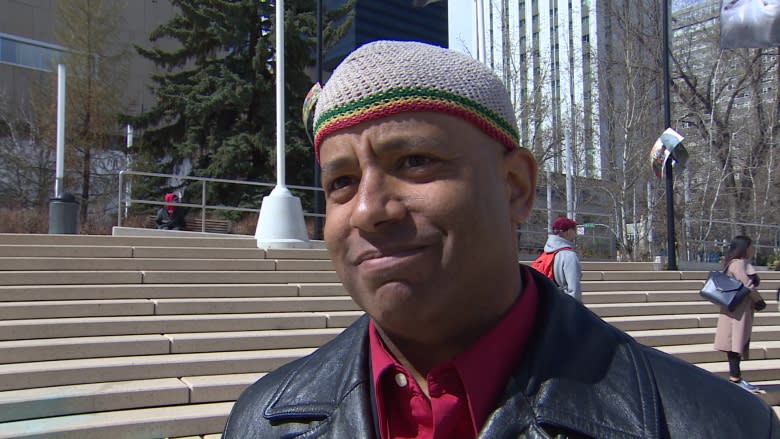Bill C-51 protesters demand Tories scrap anti-terror legislation
More than one hundred people gathered in downtown Edmonton Saturday, kicking off another round of protests over Canada's proposed anti-terror law.
"I hope they're listening to everyone across the country who is out speaking about C-51," said Jenna Broomfield, a University of Alberta law student who spoke to the crowd.
"They need to listen to individual Canadians. We don't want Bill C-51."
Protesters joined other rallies across the country to denounce the bill, which is making its way through the House of Commons.
Bill C-51 would expand the powers of CSIS and allow police in terrorism-related investigations.
It would also give police more powers to target threats to Canadian security, which the act defines as including influencing the government through "unlawful means" and interfering with the country's "financial stability."
Broomfield argued the broad definitions and vagueness of the bill means it could be used to punish those protesting the government's actions. She added that as an Inuit woman, she was especially concerned that it could be used to silence those advocating for aboriginal rights.
"For us, it's very important to make sure we can still speak and make changes politically within the system," she said.
Many opponents of the bill argue that it could also be used to shut down environmental activists and lumps peaceful demonstrations in with terrorist activities.
Government proposes C-51 changes
Earlier this month, the Conservative Party said it will propose a handful of amendments to the bill to address those concerns.
The likely amendments include provisions to narrow what is considered terrorism-related activity, as well as a section to clarify that CSIS will not have power of arrest.
Changes are also expected to limit information-sharing.
Despite the proposed changes, many at Saturday's rally called for the entire bill to be scrapped. Author Malcolm Azania, who also spoke at the rally, said the amendments will not change the core problems with C-51.
"This bill does not represent Canadians' concerns, although it might represent some fears that we have," he said.
He said the lack of oversight over information-sharing makes it too easy to misuse the legislation to silence critics. As well, Azania argues that new powers are not needed to combat terrorism. Instead, more effort needs to be put into foreign policy changes and preventing radicalization before it begins.
"We've already got laws to deal with radicals and criminals, and one of the best ways to deal with this problem is to stop it before it starts," he said.
Azania would like to see Canada's opposition parties to find a way to stop the bill. However, he admits it is unlikely, given a Conservative majority in parliament. As well, the Liberals have pledged to support C-51 despite expressing misgivings about some of its provisions.
Ultimately, Azania believes a federal election is the best shot for opponents hoping to kill the bill.
"You got to fight the fight that's in front of you but keep preparing for the one that's ahead," he said.
Similar rallies were held in other cities, including Vancouver, Regina and Halifax.



